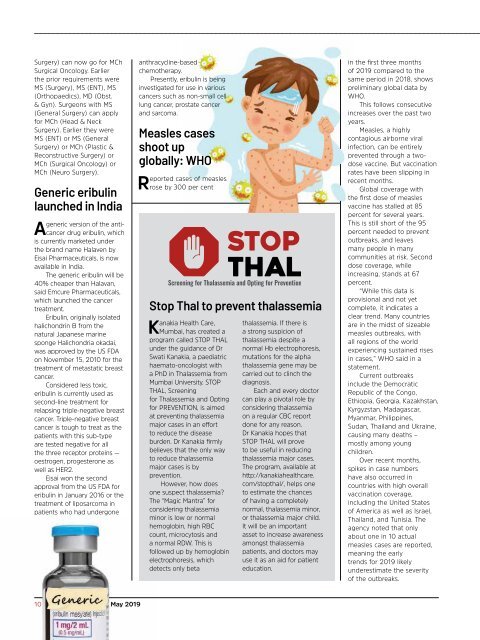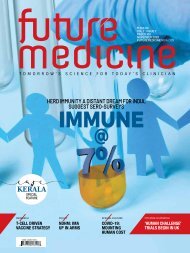may edition file
Create successful ePaper yourself
Turn your PDF publications into a flip-book with our unique Google optimized e-Paper software.
Surgery) can now go for MCh<br />
Surgical Oncology. Earlier<br />
the prior requirements were<br />
MS (Surgery), MS (ENT), MS<br />
(Orthopaedics), MD (Obst.<br />
& Gyn). Surgeons with MS<br />
(General Surgery) can apply<br />
for MCh (Head & Neck<br />
Surgery). Earlier they were<br />
MS (ENT) or MS (General<br />
Surgery) or MCh (Plastic &<br />
Reconstructive Surgery) or<br />
MCh (Surgical Oncology) or<br />
MCh (Neuro Surgery).<br />
Generic eribulin<br />
launched in India<br />
Ageneric version of the anticancer<br />
drug eribulin, which<br />
is currently marketed under<br />
the brand name Halaven by<br />
Eisai Pharmaceuticals, is now<br />
available in India.<br />
The generic eribulin will be<br />
40% cheaper than Halavan,<br />
said Emcure Pharmaceuticals,<br />
which launched the cancer<br />
treatment.<br />
Eribulin, originally isolated<br />
halichondrin B from the<br />
natural Japanese marine<br />
sponge Halichondria okadai,<br />
was approved by the US FDA<br />
on November 15, 2010 for the<br />
treatment of metastatic breast<br />
cancer.<br />
Considered less toxic,<br />
eribulin is currently used as<br />
second-line treatment for<br />
relapsing triple-negative breast<br />
cancer. Triple-negative breast<br />
cancer is tough to treat as the<br />
patients with this sub-type<br />
are tested negative for all<br />
the three receptor proteins —<br />
oestrogen, progesterone as<br />
well as HER2.<br />
Eisai won the second<br />
approval from the US FDA for<br />
eribulin in January 2016 or the<br />
treatment of liposarcoma in<br />
patients who had undergone<br />
anthracycline-based<br />
chemotherapy.<br />
Presently, eribulin is being<br />
investigated for use in various<br />
cancers such as non-small cell<br />
lung cancer, prostate cancer<br />
and sarcoma.<br />
Measles cases<br />
shoot up<br />
globally: WHO<br />
Reported cases of measles<br />
rose by 300 per cent<br />
Stop Thal to prevent thalassemia<br />
Kanakia Health Care,<br />
Mumbai, has created a<br />
program called STOP THAL<br />
under the guidance of Dr<br />
Swati Kanakia, a paediatric<br />
haemato-oncologist with<br />
a PhD in Thalassemia from<br />
Mumbai University. STOP<br />
THAL, Screening<br />
for Thalassemia and Opting<br />
for PREVENTION, is aimed<br />
at preventing thalassemia<br />
major cases in an effort<br />
to reduce the disease<br />
burden. Dr Kanakia firmly<br />
believes that the only way<br />
to reduce thalassemia<br />
major cases is by<br />
prevention.<br />
However, how does<br />
one suspect thalassemia?<br />
The “Magic Mantra” for<br />
considering thalassemia<br />
minor is low or normal<br />
hemoglobin, high RBC<br />
count, microcytosis and<br />
a normal RDW. This is<br />
followed up by hemoglobin<br />
electrophoresis, which<br />
detects only beta<br />
thalassemia. If there is<br />
a strong suspicion of<br />
thalassemia despite a<br />
normal Hb electrophoresis,<br />
mutations for the alpha<br />
thalassemia gene <strong>may</strong> be<br />
carried out to clinch the<br />
diagnosis.<br />
Each and every doctor<br />
can play a pivotal role by<br />
considering thalassemia<br />
on a regular CBC report<br />
done for any reason.<br />
Dr Kanakia hopes that<br />
STOP THAL will prove<br />
to be useful in reducing<br />
thalassemia major cases.<br />
The program, available at<br />
http://kanakiahealthcare.<br />
com/stopthal/, helps one<br />
to estimate the chances<br />
of having a completely<br />
normal, thalassemia minor,<br />
or thalassemia major child.<br />
It will be an important<br />
asset to increase awareness<br />
amongst thalassemia<br />
patients, and doctors <strong>may</strong><br />
use it as an aid for patient<br />
education.<br />
in the first three months<br />
of 2019 compared to the<br />
same period in 2018, shows<br />
preliminary global data by<br />
WHO.<br />
This follows consecutive<br />
increases over the past two<br />
years.<br />
Measles, a highly<br />
contagious airborne viral<br />
infection, can be entirely<br />
prevented through a twodose<br />
vaccine. But vaccination<br />
rates have been slipping in<br />
recent months.<br />
Global coverage with<br />
the first dose of measles<br />
vaccine has stalled at 85<br />
percent for several years.<br />
This is still short of the 95<br />
percent needed to prevent<br />
outbreaks, and leaves<br />
many people in many<br />
communities at risk. Second<br />
dose coverage, while<br />
increasing, stands at 67<br />
percent.<br />
“While this data is<br />
provisional and not yet<br />
complete, it indicates a<br />
clear trend. Many countries<br />
are in the midst of sizeable<br />
measles outbreaks, with<br />
all regions of the world<br />
experiencing sustained rises<br />
in cases,” WHO said in a<br />
statement.<br />
Current outbreaks<br />
include the Democratic<br />
Republic of the Congo,<br />
Ethiopia, Georgia, Kazakhstan,<br />
Kyrgyzstan, Madagascar,<br />
Myanmar, Philippines,<br />
Sudan, Thailand and Ukraine,<br />
causing many deaths –<br />
mostly among young<br />
children.<br />
Over recent months,<br />
spikes in case numbers<br />
have also occurred in<br />
countries with high overall<br />
vaccination coverage,<br />
including the United States<br />
of America as well as Israel,<br />
Thailand, and Tunisia. The<br />
agency noted that only<br />
about one in 10 actual<br />
measles cases are reported,<br />
meaning the early<br />
trends for 2019 likely<br />
underestimate the severity<br />
of the outbreaks.<br />
10 May 2019


















